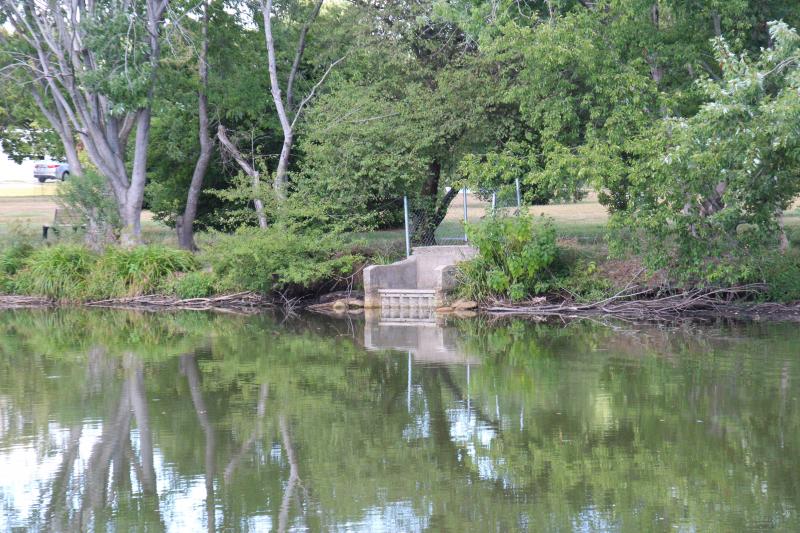Relentless heat combined with little to no rain has dried up non-irrigated crops, forced early harvest, and lowered the levels of Blockhouse Pond in Lewes to the point where pipes have been exposed. The entire state of Delaware is in a drought, with some areas of Sussex County substantially drier than others. Delaware Secretary of Agriculture Michael Scuse said while Delaware’s aquifers are well stocked and they face different challenges than states out west, it’s important to be aware of drought impacts.
The Cape Region, in particular, is in a moderate drought, with less than 2 inches of precipitation in the last 30 days, which is roughly 2 to 3 inches less than what is normally expected, according to the Delaware Climate Office.
“We’ve had corn die off prematurely that’s not irrigated; you’re seeing some corn that’s being harvested a little bit earlier than we would normally start just because that corn has died because of a lack of rainfall,” Scuse said
Extreme heat is taxing what little moisture remains in the atmosphere for the plants. Scuse said there have been about 40 days this year when temperatures have climbed to the 90-degree mark, draining the plants.
“It’s taking a toll on the soybean crop, both the full-season crop and the double crop after wheat and barley. The extreme heat and dry weather are taking a toll on those bean yields right now,” Scuse said.
Humidity, though it can feel like it sometimes, is not precipitation and does not provide the plants with the water they need. Residential gardeners will need to supplement their water supply during such arid times. Scuse suggests watering plants later in the afternoon/early evening to avoid heat evaporation. The development of drought-resistant crops over the last 10 to 15 years should help to mitigate damages to non-irrigated crops, but losses are still expected. Luckily, most of Delaware’s crops have irrigation systems.
Currently, the drought consumes much of the northeastern seaboard, as far north as Maine and as far west as the Great Lakes. Connecticut, Rhode Island and Massachusetts are experiencing the worst conditions and are in an extreme drought. While it is hurricane season, the type of weather a hurricane brings also conjures up its own set of problems. Fortunately, there are more than just hurricanes forming in the Atlantic Ocean.
“If we have a storm come up the coast and give us a couple of inches of rain, that would be a blessing for the agriculture communities, as long as we don’t get a full-blown hurricane with the wind,” Scuse said.
Wells with low levels of water could also dry up if precipitation does not arrive soon. Residents living in rural areas relying on wells for their water should check the water levels to make sure they remain sufficient. While it isn’t a well, the water level at Blockhouse Pond in George H.P. Smith Park in Lewes is a prime example of dry conditions and the effects they have on bodies of water.
Lewes Parks and Recreation Commissioner Ed Tessein, who oversees the park, relayed his concerns during the Aug. 30 joint meeting between Lewes Mayor and City Council and the Lewes Board of Public Works. The pond is a part of the BPW’s stormwater management, and levels have gotten so low that pipes and pollution have been exposed. Fed by springs from below and rain water from above, the water level is maintained naturally through precipitation and evaporation. Warmer nights and higher dew points have limited what officials refer to as the cooling-down period, and evaporation has occurred at a higher rate as a result.
It was revealed by the BPW that the State of Delaware had allowed flow from the former school building near the pond, as well as a few other buildings, into the water. Both of the exposed pipes were broken and didn’t appear to be in use, but one was connected to a structure in the pond. Officials said they did not know the exact origin of the pipes but pointed out that the unfortunate circumstances will allow them to investigate and possibly find those answers. Swimming is not allowed in the pond, as catch-and-release fishing is the only recreational activity permitted. City engineer Charlie O’Donnell said the pond is 14-inches below its normal water table.
The National Weather Service does not currently have a chance of rain greater than 50% predicted in its forecast. Some weather forecasts predict thunderstorms rolling in Sunday, sticking around for Labor Day, and rolling out early next week, but recent storms have brought little relief and the precipitation is not guaranteed.
More information about drought conditions in Delaware is available at https://climate.udel.edu/data/current-climate-summary-maps.



























































